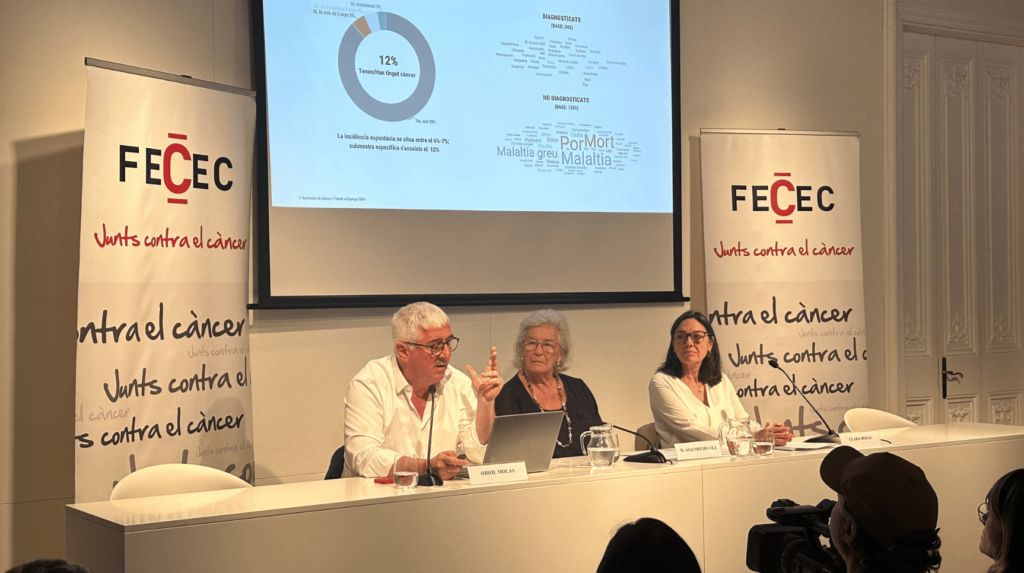This morning the conclusions of the 1st Barometer Cancer and Work in Spain have been presented, promoted by the Catalan Federation of Entities against Cancer (FECEC) with the objective of creating a measure of measure and management of occupational health indicators and identify potentials and opportunities for an adequate work-life balance for people with cancer and companies.
More than 2,000 workers aged between 16 and 65 living in Spain have participated in this study prepared by the sociology agency GAPS. Of these, 12% have or have had cancer and 56% have shared a job with a person suffering from cancer. This study and the 2nd Cancer and Work Barometer in Catalonia were presented this morning at the Col·legi de Periodistes de Catalunya in Barcelona. The event included the participation of the president of the FECEC, Maria Assumpció Vilà, the manager of the Federation, Clara Rosàs, and the director of the sociology agency GAPS, Oriol Molas.
These are the main results:

45% of people diagnosed with cancer have not returned to work gradually after completing their treatment, even though most would have liked to do so. Those who have returned gradually consider it positive.
More and better support from companies is needed

64% of respondents believe that companies should adopt a protocol to manage the impact of cancer at work. In addition, 76% ask that organizations become more involved in the disclosure of cancer in the workplace.
As for support in the workplace, people diagnosed with cancer perceive that this falls mainly on their colleagues and immediate boss. In this regard, 48% of those surveyed say that the company has not found a substitute for the person with cancer during their sick leave. Thus, 31% believe that the company does not provide sufficient support to workers who suffer from the disease.
Work is an important element for people diagnosed

Among those surveyed and diagnosed with the disease, 67% say that working is important and that work is one of the aspects that gives meaning to their lives. This percentage is 12 points higher than that of undiagnosed people who have an opinion on the same issue.
As for returning to work after cancer, 66% say they returned to their job and 11% changed their type of work due to their health situation. It must be said, however, that in the vast majority of cases changes had to be made, such as combining face-to-face and remote work, physically adapting the work space, with a reduction in hours, etc.
The stigma of cancer at work has room for improvement

Regarding the stigma of cancer at work, 35% of the workers surveyed doubt that people with cancer have the same opportunities for professional growth as everyone else. 66% of workers who currently have cancer feel vulnerable in their workplace.
Despite not being obliged to do so, most workers inform their work environment that they have been diagnosed with cancer and 12% of those affected do not report that they have the disease.
The trend is for this to be increasingly explained. Of the workers who share the diagnosis at work, 12% believe that the treatment they receive is more distant from the work environment.
2nd Barometer Cancer and Work in Catalonia
In 2022, FECEC Junts contra el Càncer published the 1st Barometer Cancer and Work. This second edition provides similar results to the edition in Spain and shows stability in the evolution of the indicators in this 2-year period. In general, it seems that the various indicators have improved slightly.
The 40% of diagnosed people surveyed say they have not been able to return to work gradually after treatment. Compared to the 2022 study, this year economic reasons are mentioned more as a reason for continuing to work.
As for the stigma of cancer at work, the situation is shared in similar numbers as two years ago with colleagues and managers, but the percentage of people with cancer who believe that their work environment has been more distant has dropped from 27% to 19%.
Now, the feeling is that companies are giving more support to employees with cancer (65% compared to 53% two years ago) and the number of people who think that the company does not provide information about the impact of cancer on their work has dropped from 42% to 31%.
Despite all this, 74% of employees (similar to two years ago) still ask for more information and divulgation about cancer in the company. Finally, 77% of employees demand a protocol to manage the impact of cancer at work.
With the data presented, the president of FECEC Junts contra el Càncer, Maria Assumpció Vilà, has stated that “it shows that the problems that arise are structural. There is still much to be done to ensure that all workers can make a gradual return to work.” In this sense, FECEC Junts contra el Càncer calls for the promotion of a legislative reform that guarantees better social and labour protection for people with cancer; it recommends that collective agreements include clauses for this progressive return to work; as well as a protocol for managing the impact of cancer on organisations.
The FECEC also wanted to talk about the measure proposed last week by the Minister of Inclusion, Social Security and Migration of Spain, Elma Saiz, on flexible sick leave. The manager of the FECEC, Clara Rosàs, has stated that “in the absence of specifics, we consider it positive that a debate of this nature is being opened because it implicitly recognises that the current system of sick leave is inefficient in responding to the needs of people with cancer”. The FECEC would find this future regulation positive as long as it is subject to medical supervision, to the voluntary nature of the worker, does not violate their labour rights and allows for improved productivity in companies.
Regarding the role of companies, Rosàs has stated that “it is necessary for companies to develop these management protocols to support affected workers and minimise the impact on the rest of the organisation”. The manager has stated that this tool can also help to improve the dissemination and information about the disease in the work environment, and that more synergies are needed between companies and entities. In this sense, the FECEC is available to companies to help them in this process.
Technical note on the study:
The 1st Barometer Cancer and Work in Spain was prepared by GAPS. A total of 2,004 surveys were conducted on a representative sample of the working population residing in Spain. Of these, 1,002 correspond to the sample of the 2nd Barometer Cancer and Work in Catalonia, which have been incorporated in a weighted manner. The set of surveys includes a subsample of 12% of people diagnosed with cancer. Data collection was carried out between January 17 and 31, 2024. The overall margin of error is ±2.24% for the 1st Cancer and Work Barometer in Spain and ±3.16% for the 2nd Cancer and Work Barometer in Catalonia, with a confidence interval of 95.5% and the assumption of maximum indeterminacy, where p=q=50 and k=2.
These barometers have been supported by the Diputació de Barcelona, Fundació la Caixa, Novartis and the Department of Health of the Generalitat de Catalunya.
Download the infographic here of the 1st Barometer Cancer and Work in Spain 2024
Download the infographic here of 2n Barometer Cancer and Work in Catalonia 2024

 CAT
CAT ES
ES
